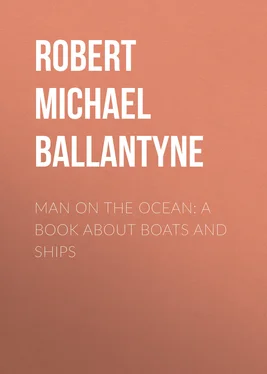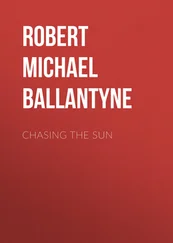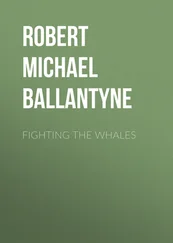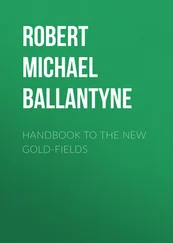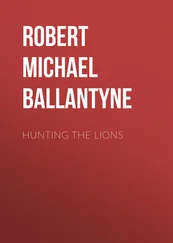Robert Michael Ballantyne - Man on the Ocean - A Book about Boats and Ships
Здесь есть возможность читать онлайн «Robert Michael Ballantyne - Man on the Ocean - A Book about Boats and Ships» — ознакомительный отрывок электронной книги совершенно бесплатно, а после прочтения отрывка купить полную версию. В некоторых случаях можно слушать аудио, скачать через торрент в формате fb2 и присутствует краткое содержание. Жанр: foreign_desc, Технические науки, на английском языке. Описание произведения, (предисловие) а так же отзывы посетителей доступны на портале библиотеки ЛибКат.
- Название:Man on the Ocean: A Book about Boats and Ships
- Автор:
- Жанр:
- Год:неизвестен
- ISBN:нет данных
- Рейтинг книги:5 / 5. Голосов: 1
-
Избранное:Добавить в избранное
- Отзывы:
-
Ваша оценка:
- 100
- 1
- 2
- 3
- 4
- 5
Man on the Ocean: A Book about Boats and Ships: краткое содержание, описание и аннотация
Предлагаем к чтению аннотацию, описание, краткое содержание или предисловие (зависит от того, что написал сам автор книги «Man on the Ocean: A Book about Boats and Ships»). Если вы не нашли необходимую информацию о книге — напишите в комментариях, мы постараемся отыскать её.
Man on the Ocean: A Book about Boats and Ships — читать онлайн ознакомительный отрывок
Ниже представлен текст книги, разбитый по страницам. Система сохранения места последней прочитанной страницы, позволяет с удобством читать онлайн бесплатно книгу «Man on the Ocean: A Book about Boats and Ships», без необходимости каждый раз заново искать на чём Вы остановились. Поставьте закладку, и сможете в любой момент перейти на страницу, на которой закончили чтение.
Интервал:
Закладка:
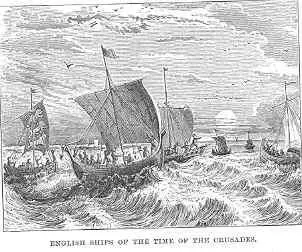
The result of all this was that there was a great moving, and, to some extent, commingling of the nations. The knowledge of arts and manufactures was interchanged, and of necessity the knowledge of various languages spread. The West began constantly to demand the products of the East, wealth began to increase, and the sum of human knowledge to extend.
Shortly after this era of opening commercial prosperity in the Mediterranean, the hardy Northmen performed deeds on the deep which outrival those of the great Columbus himself, and were undertaken many centuries before his day.
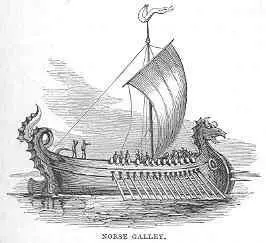
The Angles, the Saxons, and the Northmen inhabited the borders of the Baltic, the shores of the German Ocean, and the coasts of Norway. Like the nations on the shores of the Mediterranean, they too became famous navigators; but, unlike them, war and piracy were their chief objects of pursuit. Commerce was secondary.
In vessels resembling that of which the above is a representation, those nations went forth to plunder the dwellers in more favoured climes, and to establish the Anglo-Saxon dominion in England; and their celebrated King Alfred became the founder of the naval power of Britain, which was destined in future ages to rule the seas.
It was the Northmen who, in huge open boats, pushed off without chart or compass (for neither existed at that time) into the tempestuous northern seas, and, in the year 863, discovered the island of Iceland; in 983, the coast of Greenland; and, a few years later, those parts of the American coast now called Long Island, Rhode Island, Massachusetts, Nova Scotia, and Newfoundland. It is true they did not go forth with the scientific and commercial views of Columbus; neither did they give to the civilised world the benefit of their knowledge of those lands. But although their purpose was simply selfish, we cannot withhold our admiration of the bold, daring spirit displayed by those early navigators, under circumstances of the greatest possible disadvantage—with undecked or half-decked boats, meagre supplies, no scientific knowledge or appliances, and the stars their only guide over the trackless waste of waters.
In the course of time, one or two adventurous travellers pushed into Asia, and men began to ascertain that the world was not the insignificant disc, or cylinder, or ball they had deemed it. Perhaps one of the chief among those adventurous travellers was Marco Polo, a Venetian, who lived in the latter part of the thirteenth century. He made known the central and eastern portions of Asia, Japan, the islands of the Indian Archipelago, part of the continent of Africa, and the island of Madagascar, and is considered the founder of the modern geography of Asia.
The adventures of this wonderful man were truly surprising, and although he undoubtedly exaggerated to some extent in his account of what he had seen, his narrations are for the most part truthful. He and his companions were absent on their voyages and travels twenty-one years.
Marco Polo died; but the knowledge of the East opened up by him, his adventures and his wealth, remained behind to stir up the energies of European nations. Yet there is no saying how long the world would have groped on in this twilight of knowledge, and mariners would have continued to “hug the shore” as in days gone by, had not an event occurred which at once revolutionised the science of navigation, and formed a new era in the history of mankind. This was the invention of the mariner’s compass.
Chapter Five.
The Mariner’s Compass—Portuguese Discoveries
“What is the compass?” every philosophical youth of inquiring disposition will naturally ask. We do not say that all youths will make this inquiry. Many there are who will at once say, “Oh, I know! It’s a needle with a card on the top of it—sometimes a needle with a card under it—which always points to the north, and shows sailors how to steer their ships.”
Very well explained indeed, my self-sufficient friend; but you have not answered the question. You have told us what a compass is like, and one of the uses to which it is applied; but you have not yet told what it is . A man who had never heard of a compass might exclaim, “What! a needle! Is it a darning needle, or a knitting needle, or a drawing-through needle? And which end points to the north—the eye or the point? And if you lay it on the table the wrong end to the north, will it turn round of its own accord?”
You laugh, perhaps, and explain; but it would have been better to have explained correctly at first. Thus:—
The mariner’s compass is a small, flat bar of magnetised steel, which, when balanced on a pivot, turns one of its ends persistently towards the north pole—the other, of course, towards the south pole; and it does this in consequence of its being magnetised. A card is fixed above, sometimes below, this bar of steel (which is called the needle), whereon are marked the cardinal points—north, south, east, and west—with their subdivisions or intermediate points, by means of which the true direction of any point can be ascertained.
“Aha!” you exclaim, “Mr Author, but you yourself have omitted part of the explanation. Why is it that the magnetising of the needle causes it to turn to the north?”
I answer humbly, “I cannot tell;” but, further, I assert confidently, “Neither can anybody else.” The fact is known, and we see its result; but the reason why magnetised steel or iron should have this tendency, this polarity, is one of the mysteries which man has not yet been able to penetrate, and probably never will.
Having explained the nature of the compass, as far as explanation is possible, we present our reader with a picture of one.
It will be seen that there are four large points—N, S, E, and W—the cardinal points above referred to, and that these are subdivided by twelve smaller points, with one little black triangular point between each, and a multitude of smaller points round the outer circle. To give these points their correct names is called “boxing the compass,”—a lesson which all seamen can trip off their tongues like A, B, C, and which most boys could learn in a few hours.
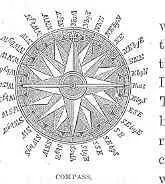
For the sake of those who are anxious to acquire the knowledge, we give the following explanation: Let us begin with north. The large point midway between N and E (to the right) is north-east . The corresponding point midway between N and W (to the left) is north-west . A glance will show that the corresponding points towards the south are respectively south-east and south-west (usually written S.E. and S.W., as the two former points are written N.E. and N.W.). Now, to read off the compass with this amount of knowledge is very simple. Thus: North , north-east , east , south-east , south , south-west , west , north-west , north . But be it observed that, in the language of the sea, the th is thrown overboard, except when the words north and south occur alone. When conjoined with other points they are pronounced thus: nor’-east, sou’-east; and so on.
To come now to the smaller subdivisions, it will suffice to take a quarter of the circle. The point midway between N.E. and N. is “nor’-nor’-east” (N.N.E.), and the corresponding one between N.E. and E. is “east nor’-east” (E.N.E.). These points are again subdivided by little black points which are thus named:– The first, next the N., is “north by east” (N. by E.); the corresponding one next the E. is “east by north” (E. by N.). The second black point from N. is “nor’-east by north” (N.E. by N.), and the corresponding one—namely, the second black point from east—is “nor’-east by east” (N.E. by E.). Thus, in reading off the compass, we say—beginning at north and proceeding to east—North: north by east; nor’-nor’-east; nor’-east by north; nor’-east; nor’-east by east; east nor’-east; east by north; east;—and so on with the other quarters of the circle.
Читать дальшеИнтервал:
Закладка:
Похожие книги на «Man on the Ocean: A Book about Boats and Ships»
Представляем Вашему вниманию похожие книги на «Man on the Ocean: A Book about Boats and Ships» списком для выбора. Мы отобрали схожую по названию и смыслу литературу в надежде предоставить читателям больше вариантов отыскать новые, интересные, ещё непрочитанные произведения.
Обсуждение, отзывы о книге «Man on the Ocean: A Book about Boats and Ships» и просто собственные мнения читателей. Оставьте ваши комментарии, напишите, что Вы думаете о произведении, его смысле или главных героях. Укажите что конкретно понравилось, а что нет, и почему Вы так считаете.
